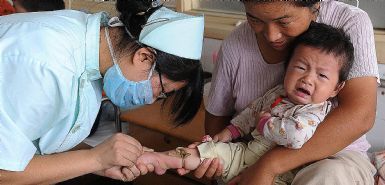
More than 1200 Chinese children have been hospitalised after drinking tainted milk formula (AFP)
Products from the dairy company whose tainted formula killed at least four babies are back on the shelves in China just as the United States issued a ban on Chinese food imports in case of similar contamination.
Such a broad ban by the Food and Drug administration on goods from an entire country rather than from a new rogue manufacturer is unusual and reflects the level of concern over how widespread the problem is in China.
Importers to the United States must now certify that food products are free of dairy or of the industrial chemical melamine that has been found in a vast array of Chinese products – from baby powder to milk powder to creamy confectionery. Failing that, the goods will be stopped at the border.
The FDA order said: “The problem of melamine contamination is not limited to infant formula products. Chinese government sources indicate contamination of milk components, especially dried milk powder, which are used in a variety of finished foods.” These are believed to spread throughout the food chain in China.
Some Chinese media knew about the scandal involving baby formula produced by the huge Sanlu Group as early as March but were unable to write about the case because of government constraints on reporting food problems during the Beijing Olympic Games.
The cover-up came to light only when the New Zealand government told the authorities in Beijing after being informed by food giant Fonterra, the New Zealand partner of Sanlu, of its failure to persuade the Chinese firm to publicise the contamination.
At least four babies have died and some 54,000 fell ill after being fed the formula laced with melamine, which can cause kidney problems and renal failure. The melamine — used in manufacturing plastics – was added at milk collecting station to artificially boost nitrogen levels to make products appear higher in protein when tested.
Dozens of families whose parents were sickened have now joined forces to challenge the government with a class action lawsuit against the dairy. Pressing ahead with such a lawsuit is highly confrontational and could anger a government that has dithered about its response and compensation and has overseen a significant reduction in news coverage in recent weeks.
After weeks of discussions, a group of 15 lawyers decided to bundle 100 cases involving nearly 100 families into a single lawsuit against Sanlu, seeking medical and other expenses as well as payments for trauma and compensation for families of those who died.
Sanlu already faces more than a dozen individual cases, but these have been caught in legal limbo with courts neither accepting or refusing to handle the cases. The vacillation reflects the political sensitivity of the issue, but also contradicts regulations that say a decision must be made within 10 days of a lawsuit being submitted.
Lawyer Xu Zhiyong said: “The victims have suffered and they deserve to be compensated.”
The government has ordered hospitals to provide free treatment to sick infants, but lawyers and parents say not all costs were covered. The Health Ministry has yet to announce details of a compensation plan.
November 14, 2008
Jane Macartney in Bejing
Source: Times Online